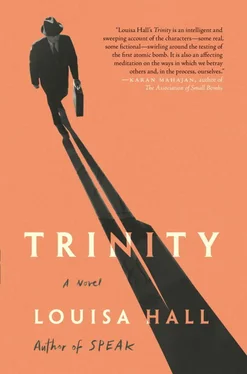I felt how it built as he climbed the back steps, then took my face in his hand, then cut off my breath when he kissed me.
IN AUSTIN, NOW HEAVILY PREGNANT, I TOOK LONG WALKS AROUNDour neighborhood, past small houses with wide lawns, along streets that were shaded by pecan trees and the glossy leaves of magnolias. I folded the laundry, or prepared lunch, or headed to the grocery store, and as I did so I developed intricate theories about the personality of my husband.
I examined him closely, and what interested me most of all were the ways in which his sweetness inside our house contrasted with the increasing roughness he advertised when we were in public.
In Texas, as if overnight, his opinions on civil rights and the feminist movement had been touched with obstinate contrarianism, which then began to shade into downright objection. At the same time, he’d begun to carry a hunting knife in his pocket. And at some point, several weeks into our time there, he bought a pistol that he kept in his nightstand.
He did so without telling me, so that one afternoon, by accident, I opened the drawer and discovered it there, squat and blunt and entirely unexpected.
Instantly, I felt accused. It was as if I’d riffled through his personal papers. As if I’d spied on him, or done something illicit.
Why, I wondered, had I gone through his drawer in the first place? There hadn’t been a good reason. I’d simply opened it out of some overly curious impulse, and found not what I was expecting or feared that I’d find, but that pistol, with its efficient body and the round O of its muzzle, squatting angrily in the drawer beside the bed that we slept in.
IT ALARMED ME, OF COURSE, BUT IN THE END I DIDN’T MENTION IT.Maybe I imagined that to ask him directly would have been cheating: a shortcut to the knowledge I was slowly collecting.
To ask a question like that would have delivered a blow to the delicate line of research I was following deeper into my husband, navigating the widening space between his interior sweetness and the roughness he demonstrated in public.
With a devotional attention to detail, after I heard him, for instance, express more and more brutal opinions to our friends and neighbors, or when I discovered that pistol, I remembered again the sweetness in his smile when he bounded up the back steps, returning to the secret place we’d created.
In our bedroom, after we’d slept together, he stroked my hair back from my face. He kissed each one of the freckles over my nose. With wonder, he touched the expanding curve of my stomach, and he laughed like a boy at the stories I told him.
I weighed such evidence against the fact of that squat little pistol, or the way he’d taken to wearing his knife so that other people could see it. And while it’s true that I found those developments disconcerting, I also hypothesized that a man of genuine brutality would have no motivation to advertise it in such an overt and obvious fashion.
A man of real brutality, I thought, would do what he could to conceal it.
PERHAPS THE FACT THAT I WAS PREGNANT INCREASED MY DESIRE TObelieve in the fidelity of the sketch I’d drawn of my husband’s sweet nature.
It was to him that I turned, after all, in those somewhat uneasy days, while in the isolation of our new home my body changed and a new person grew slowly inside me.
When he was with me in the house, I often touched him for reassurance. At night, even when I lay on my side, facing the wall, I fell asleep with one arm flung backward to reach him.
And if he was away—because almost immediately, as I should have predicted, he remembered he didn’t like teaching, and began to fly to New York and Chicago to take meetings for new public commissions—I lay awake in the dark, and turned for reassurance to the story I was telling about him, the portrait I was so carefully painting.
I retouched the lines. I added shades of new color. I treasured it, treating it gently, though sometimes, it’s true, my husband provided evidence that his nature was more complicated than I was allowing myself to imagine. Once, for instance, we had dinner with our neighbor—a young, widowed woman with a four-year-old daughter, who sometimes shyly came over for coffee—and the man she’d begun dating, a somewhat pompous little English professor.
She was the only woman in Austin with whom I’d managed to build something resembling a friendship, and my husband liked the man she was dating, or liked him enough, at least, to want to impress him. And maybe my husband had too much to drink, because over the spaghetti and meatballs my new friend had cooked, he made several brash comments about other women he’d slept with.
He made those comments in a light, joking voice, and while he did so, he slung his arm around my neck and pulled me in toward him, laughing over my head with the English professor.
Pulled in, I felt my face getting hot. I avoided making eye contact with my new friend. It was an embarrassing moment, but then it passed, and I managed to forget it completely until another dinner with the same friends.
This time, we were out at a Mexican restaurant. I found myself absorbed by a print on the wall, one of those paintings you see on the walls of old Spanish missions, depicting a train of those mournful, one-dimensional American Indian women, following Christ toward his crucifixion.
Their faces were flat, as were their hands, which were held up in the air, forming incomprehensible signs signaling the approach of an awful disaster.
There was something disturbing to me in that painting, so that while I examined it, the story my husband was telling faded somewhat into the background. I was surprised, then, when I felt him grab the back of my neck and shake me until I managed to look up in confusion.
It was nothing extreme, but it startled me. Again, it caused me to feel somewhat embarrassed in the eyes of our new friends. Not terribly so, but enough that I began to avoid them, and the woman and I met less often for coffee.
ON MOST OTHER OCCASIONS, MY HUSBAND PROVIDED A GREAT DEALof evidence of his sweet nature, so it was easy for me to feel that I was succeeding in the portrait I’d started painting. When he came home from his trips to New York or Chicago, he often got in late at night. He came to bed while I was sleeping. Then he woke me sweetly, his fingertips brushing my cheek, and when we slept together he was always almost unbearably gentle, almost apologetically tender, though I came at him with increasing roughness, having missed him as I did in his absence.
In such moments, looking at me with that expression of almost painful sympathy—an expression of sympathy so intense it almost resembled repentance felt in advance for a crime not yet committed, or for a crime I hadn’t yet apprehended—he kindly assisted me in the portrait I’d undertaken of his secret nature.
That September, we often sat on the back porch under the thick, glossy leaves of the loquat, eating fruit he pulled from the branches. He held my hand in his own. He kissed my temple. In our bed, he touched me gently, and afterward I fell asleep with my arm flung backward to reach him.
AS WE APPROACHED OUR CHILD’S DUE DATE, THE LENGTH OF MY HUSBAND’Strips to New York and Chicago began to grow longer. He wanted to finish lining up work before the child was born, and it was then, in the last several weeks leading up to the due date, after months of an oddly placid pregnancy, that I began to worry about the grave responsibilities involved with caring for a new child.
I worried about whether or not the child would be born healthy. I worried about whether something I’d done during the pregnancy had harmed him in some way, and whether I could care for him if he was terribly sick.
Читать дальше












